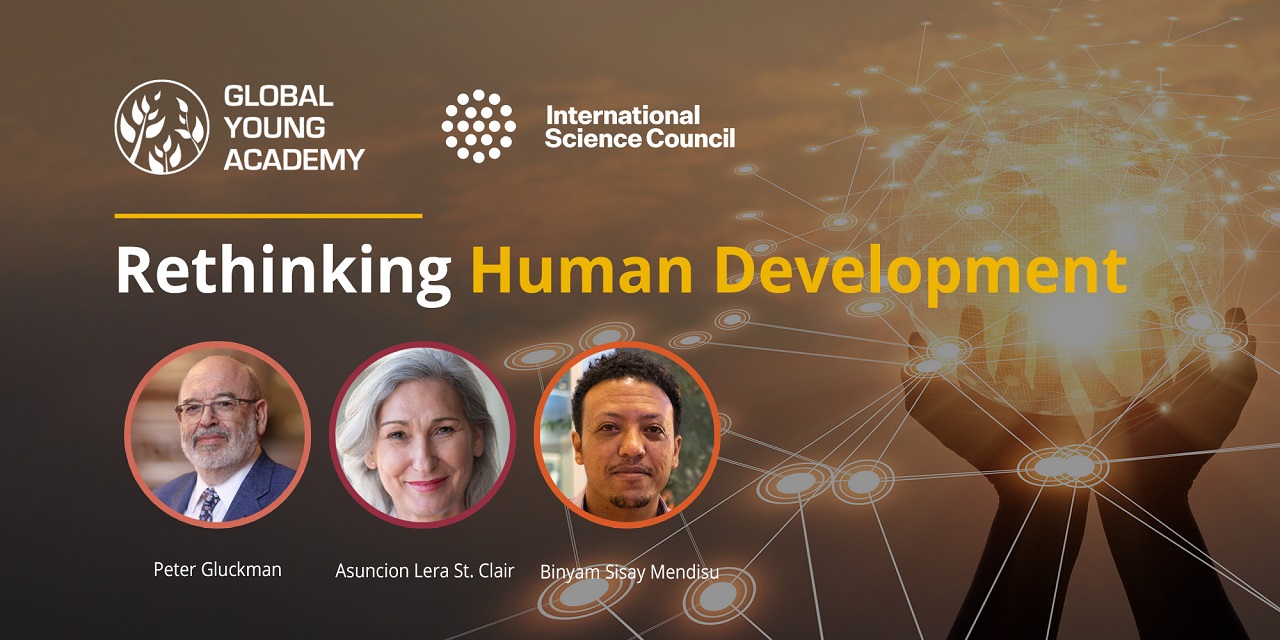In cooperation with the International Science Council (ISC), the GYA held an interactive webinar on “Rethinking Human Development” on 7 December 2020. Under the auspices of the GYA’s Science Advice Working Group, GYA member Binyam Sisay Mendisu (UNESCO International Institute for Capacity Building in Africa, Ethiopia), who served as a steering committee member of the ISC project, moderated the webinar, with key-note speakers Asuncion Lera St. Clair and Sir Peter Gluckman. The meeting aimed to gather early-career researchers’ perspectives to contribute to the wider, global conversation being facilitated by the ISC. If you missed the webinar, you can watch recordings here, and read more about the ISC project Conversations on Rethinking Human Development below.
Recordings to watch
GYA-ISC Dialogue on Rethinking Human Development – YouTube:
Full recording of 90-minute GYA-ISC webinar “Rethinking Human Development”. Speakers: Asuncion Lera St. Clair and Sir Peter Gluckman. Moderator: Binyam Sisay Mendisu. Welcome from GYA Co-Chair Michael Saliba. GYA member videos shown in this recording: Christopher Barrington Leigh, Estella Carpi and Robert Lepenies.
Interventions from GYA members: In these brief, 1-3 minute interventions, GYA members discuss human development from the points of view of their own research. The following videos address poverty, measuring happiness and policy engagement.
Subjective wellbeing and rethinking human development – YouTube:
Video by Christopher Barrington-Leigh, Economist. Associate Professor, Institute for Health and Social Policy and the School of Environment at McGill University, Canada.
What is poverty? Global Young Academy at the International Science Council – YouTube,
Or watch directly on TikTok. Video by Robert Lepenies, Political Scientist and Political Philosopher, Research Scientist, Helmholtz Centre for Environmental Research, Germany.
Conversations on Rethinking Human Development – YouTube
Video by Clarissa Rios Rojas, Molecular Biologist. Research Associate, Centre for the Study of Existential Risk, University of Cambridge, UK.
Background on Rethinking Human Development
The UN Human Development Report (HDR) has turned 30. Since the release of the first HDR in 1990, the authors of the reports and a broad range of intellectuals and agencies have worked hard to put people at the center of economic development and to argue that ‘people are the true wealth of nations.’ Since its introduction, the Human Development Report has been influential in broadening the scope of the concept of development by pointing decision makers to the multi-dimensional nature of development.
Fundamental shifts are now taking place in how we understand ourselves and our connections to local and global societies in the light of new technologies, socio-political realities and deep environmental changes. It was with this in mind that in 2019 the United Nations Development Program (UNDP) and the International Science Council (ISC) embarked on a project to rearticulate Human Development for the 21st century.
The project Steering Committee, led by eminent experts in the field of human development, was keen to promote a dialogue that broadened the lens of the human development approach to include, for example, earth and technical systems, and further inter-linked elements. In early 2020, at the height of COVID-19 pandemic’s first wave, the International Science Council (ISC) invited a wide variety of experts, and its members, to explore rethinking human development. The result is a new publication, Conversations on Rethinking Human Development: A global dialogue on human development in today’s world , complemented with a multimedia website. The publication has been released on World Science Day, on 10 November 2020, with a high level global dialogue and a series of complementary regional webinars.
One of the key findings in Conversations on Rethinking Human Development is that income as the central premise of the human development paradigm is no longer sufficient to promote and measure human well-being. Instead, human progress should be seen as a process of enlarging people’s choices and wellbeing, as well as enhancing their capabilities to live within sustainable planetary boundaries. Additionally, the report highlights that the sciences have crucial role to play in rearticulating human development in the 21st century and making sure the journey is science driven required more and better science. In fact, “the role of scientific knowledge” in rethinking human development is one of nine interconnected directions identified in the report.
